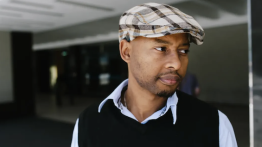Mokena Makeka Named President of SAIA
POSTED ON: February 29, 2024

On February 29, the South African Institute of Architects (SAIA) inaugurated Mokena Makeka, Cooper's special advisor to the vice president of academic affairs, as its president. The ceremony, which took place online, marks the beginning of Makeka's tenure connecting with other national presidents on issues facing the profession and the academy in search of ways to transform architecture to better support society.
In a message addressed to the Cooper community, Makeka wrote, "I have as part of my term started to institute substantial institutional reform and the process is being followed and informing the Commonwealth of architects, and several other countries."
In part, Makeka sees the role as an opportunity for potential collaborations, giving Cooper architecture students the chance to work on projects outside of studio, particularly ones that may be related to climate and bio technology.
The inauguration's theme was titled “The City of Tomorrow.” According to the SAIA, the event hoped to launch a discussion that would "imagine architecture as more than building, but thought leadership, as spatial politics, as agency of transformation toward liveable and loveable cities."




